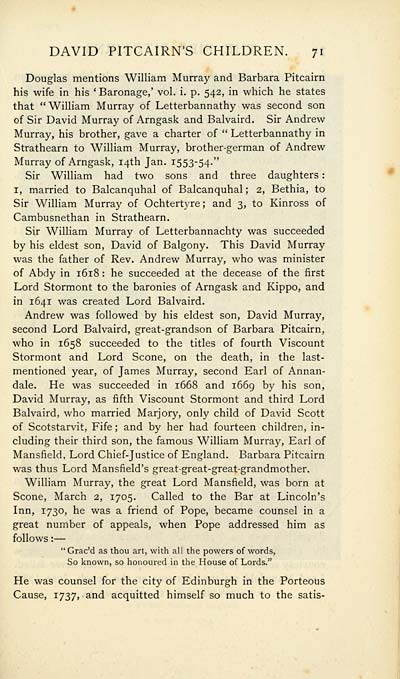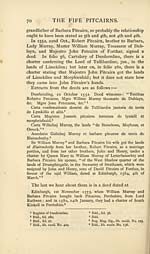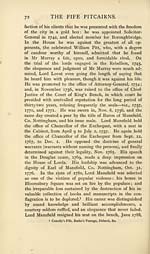History of the Fife Pitcairns
(103) Page 71
Download files
Complete book:
Individual page:
Thumbnail gallery: Grid view | List view

DAVID PITCAIRN'S CHILDREN. 71
Douglas mentions William Murray and Barbara Pitcairn
his wife in his ' Baronage,' vol. i. p. 542, in which he states
that "William Murray of Letterbannathy was second son
of Sir David Murray of Arngask and Balvaird. Sir Andrew
Murray, his brother, gave a charter of " Letterbannathy in
Strathearn to William Murray, brother-german of Andrew
Murray of Arngask, 14th Jan. 1553-54."
Sir William had two sons and three daughters :
1, married to Balcanquhal of Balcanquhal ; 2, Bethia, to
Sir William Murray of Ochtertyre; and 3, to Kinross of
Cambusnethan in Strathearn.
Sir William Murray of Letterbannachty was succeeded
by his eldest son, David of Balgony. This David Murray
was the father of Rev. Andrew Murray, who was minister
of Abdy in 1618 : he succeeded at the decease of the first
Lord Stormont to the baronies of Arngask and Kippo, and
in 1641 was created Lord Balvaird.
Andrew was followed by his eldest son, David Murray,
second Lord Balvaird, great-grandson of Barbara Pitcairn,
who in 1658 succeeded to the titles of fourth Viscount
Stormont and Lord Scone, on the death, in the last-
mentioned year, of James Murray, second Earl of Annan-
dale. He was succeeded in 1668 and 1669 by his son,
David Murray, as fifth Viscount Stormont and third Lord
Balvaird, who married Marjory, only child of David Scott
of Scotstarvit, Fife ; and by her had fourteen children, in-
cluding their third son, the famous William Murray, Earl of
Mansfield, Lord Chief-Justice of England. Barbara Pitcairn
was thus Lord Mansfield's great-great-great-grandmother.
William Murray, the great Lord Mansfield, was born at
Scone, March 2, 1705. Called to the Bar at Lincoln's
Inn, 1730, he was a friend of Pope, became counsel in a
great number of appeals, when Pope addressed him as
follows : —
" Grac'd as thou art, with all the powers of words,
So known, so honoured in the House of Lords."
He was counsel for the city of Edinburgh in the Porteous
Cause, 1737, and acquitted himself so much to the satis-
Douglas mentions William Murray and Barbara Pitcairn
his wife in his ' Baronage,' vol. i. p. 542, in which he states
that "William Murray of Letterbannathy was second son
of Sir David Murray of Arngask and Balvaird. Sir Andrew
Murray, his brother, gave a charter of " Letterbannathy in
Strathearn to William Murray, brother-german of Andrew
Murray of Arngask, 14th Jan. 1553-54."
Sir William had two sons and three daughters :
1, married to Balcanquhal of Balcanquhal ; 2, Bethia, to
Sir William Murray of Ochtertyre; and 3, to Kinross of
Cambusnethan in Strathearn.
Sir William Murray of Letterbannachty was succeeded
by his eldest son, David of Balgony. This David Murray
was the father of Rev. Andrew Murray, who was minister
of Abdy in 1618 : he succeeded at the decease of the first
Lord Stormont to the baronies of Arngask and Kippo, and
in 1641 was created Lord Balvaird.
Andrew was followed by his eldest son, David Murray,
second Lord Balvaird, great-grandson of Barbara Pitcairn,
who in 1658 succeeded to the titles of fourth Viscount
Stormont and Lord Scone, on the death, in the last-
mentioned year, of James Murray, second Earl of Annan-
dale. He was succeeded in 1668 and 1669 by his son,
David Murray, as fifth Viscount Stormont and third Lord
Balvaird, who married Marjory, only child of David Scott
of Scotstarvit, Fife ; and by her had fourteen children, in-
cluding their third son, the famous William Murray, Earl of
Mansfield, Lord Chief-Justice of England. Barbara Pitcairn
was thus Lord Mansfield's great-great-great-grandmother.
William Murray, the great Lord Mansfield, was born at
Scone, March 2, 1705. Called to the Bar at Lincoln's
Inn, 1730, he was a friend of Pope, became counsel in a
great number of appeals, when Pope addressed him as
follows : —
" Grac'd as thou art, with all the powers of words,
So known, so honoured in the House of Lords."
He was counsel for the city of Edinburgh in the Porteous
Cause, 1737, and acquitted himself so much to the satis-
Set display mode to:
![]() Universal Viewer |
Universal Viewer | ![]() Mirador |
Large image | Transcription
Mirador |
Large image | Transcription
Images and transcriptions on this page, including medium image downloads, may be used under the Creative Commons Attribution 4.0 International Licence unless otherwise stated. ![]()
| Histories of Scottish families > History of the Fife Pitcairns > (103) Page 71 |
|---|
| Permanent URL | https://digital.nls.uk/95716887 |
|---|
| Description | A selection of almost 400 printed items relating to the history of Scottish families, mostly dating from the 19th and early 20th centuries. Includes memoirs, genealogies and clan histories, with a few produced by emigrant families. The earliest family history goes back to AD 916. |
|---|

